Monday, June 30, 2003
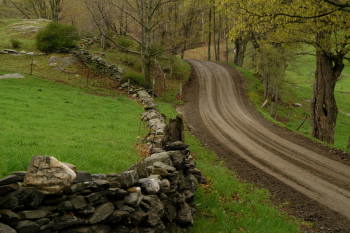
ECOTONE TOPIC for 7/01/03: How are we defined and shaped by the place we live?
The first twenty-five years of my life were spent in the rural, dairy country of central New York State. For the second twenty-five I’ve lived in Vermont and New Hampshire, also in fairly rural areas, but ones that had different landscapes and social personalities from rural New York. That was true when I moved here, but today this place has become far more influenced and pressured by urban sensibilities than the one where I grew up. I’ve taken on some of the characteristics of my adopted home, but I think I remain, at my core, a product of the place I was born and an alien here – well-adapted and content, but alien all the same.
Everybody comments – or used to, when it was more homogeneous – on the laconic nature of New Englanders: there are hundreds of jokes about the “aye-yup” that’s all you get for a positive response when doing your best to start a conversation, or the way new neighbors up here don’t say much, or drop by, or even ask you over – although they’ll always show up in an emergency. Coming from a place that is far more Midwestern in hospitality and open friendliness, I remember being shocked at first when my naturally friendly overtures got so little response. After a while, when the natives figure out that you’re staying, there’s a thaw leading to acceptance and affection, but even after living here half my lifetime I know I’ll never feel native – despite the fact that my ancestors came from here back in the late 1700s!
I’ve been wondering about how the land shapes its overlying social fabric. Life was certainly no less hard for the early colonists of New England than for the folks who traveled a few hundred miles west. People needed each other just as much. But the land here is so different: the valleys narrower; the mountains higher and more difficult to cross; the rivers wide and filled with difficult falls; the climate harsher; the earth rockier; wells harder to dig; and the growing season considerably shorter.
On a macro-level, travel and (practically everything else) was difficult. So was building an infrastructure. Actually, there are a lot of dirt roads here still, and many of them aren’t maintained or passable in the winter. Paved roads suffer a lot of damage every year from frost heaves, so it’s understandable why they aren’t built unless absolutely necessary.
On a micro-level, it’s even difficult to see your neighbors here, except of course if you live in town. The way the land is shaped, you don’t always get clear sightlines across a broad open field to your neighbor’s house or barn; there are always woods in-between, and hills, and rocks. Nothing is flat, or even rolling, especially, and the bony skeleton of the earth is always sticking up a shoulder or elbow right in your way. So while there’s a long tradition here of cooperative barn-raisings and town meetings, I think the land had a lot to do with forcing people into self-sufficiency and a private pride that shaped speech patterns and social interaction.
Back in central New York, there aren’t mountains. The sky is bigger, travel easier, and you can’t help but see your neighbors. My great-aunt and grandmother told of constant “visiting” between members of the extended family, spread over the same hills and valley, and they knew every neighbor – and every neighbor’s idiosyncrasies, as well as their horses and dogs.
Things haven’t changed that much back there. People drop in constantly, and you know everybody’s business because people talk to each other, and because social life is central in a place where people tend to stay put. But also, I think, you can see what people are up to. As a result, excessive desire for personal privacy or unwillingness to “be social” is seen as aloofness or quirkiness. Instead being left alone, people like that tend to be coaxed or teased into interaction. Likewise, there’s almost no tolerance for dishonesty, secrecy, or phoniness because it’s quickly discovered and exposed.
In the case of central New York, not many people move in or out. Those who come do so because they want that kind of environment – or they quickly leave when they find out they’ve moved to a fish bowl where joining the “school” is a lot more important and acceptable than being a big fish. But up here in northern New England, the tradition of privacy is now attracting a certain kind of wealthy person who is escaping urban life. They already feel separate and, often, superior, so why should they want to enter into a community – especially one which seems diffuse and hard to understand? They want their big house on top of the hill, or at the end of a long winding driveway. The land offers them what they want, and they have the money to buy its beauty and the privacy it affords; if it costs a small fortune to drill a well through ledge, or construct a half-mile driveway up a mountain, that’s simply not a problem.
For a decade or two, these immigrants to New England have been a minority, lacking power in local politics and eventually retreating into isolation or adapting to the underlying culture. But now it’s changing. The influx of so many suburban and urban escapees into certain areas is creating demand for sophisticated services and products: a transplantation of urban amenities. The best valley farmland is now worth far more as condominiums and office complexes; box stores with national franchises fill sprawling malls and empty the traditional downtowns; and growers, bakers, and crafters bring their products to fancy “farmers’ markets” on Saturdays – a favorite “quaint” place for the new residents to bring family and friends visiting from the city.
New residents often come here for good jobs in technology, medicine, and education in a place that’s beautiful but not uncomfortably far from major East coast cities. Like so many Americans, they don’t grow roots and stay a lifetime. In our area, the average stay for these migratory residents is seven years. I doubt if they are comforted, really, by the natural landscape, although they may admire it. For so many, what seems to be comforting and grounding is the created landscape of malls and interior spaces that look, feel, taste and sound alike everywhere.
Yesterday we drove in back of yet another giant concrete box, going up in a field above the river. I used to watch great blue herons there, and once a bald eagle – now it’s an asphalt desert, and a memory.
The land used to shape and define us. Now we’re shaping the land.
Please read worldwide thoughts on this topic at the Ecotone Wiki for July 1, 2003
9:36 PM
|
Sunday, June 29, 2003
AN IRANIAN BREAKFAST
The four of us sat in the backyard at a glass table under a canopy. There were delicious eggs with tomatoes, onions, and red peppers; small apple muffins; warm barbari bread and a platter of fresh sabzi (green herbs), the best Bulgarian feta, and walnuts that had been soaked overnight to make them taste like fresh ones. And of course, tea.
The fountain gurgled in Shirin’s new little pool, and every now and then the neighborhood cat, yellow and white, came over and sat among the flowers, staring at the two goldfish swimming in the water.
We talked about the anti-government demonstrations in Iran, and the differences between the Islamic revolution and the current crisis, and whether the injunction for Shi’ia not to hold Friday prayers when the ruler is corrupt should apply as much now as it did in the time of the Shah. And when we grew tired and sad thinking about this, we drank more tea and talked about whether the initial loop on the character mim should be made clockwise or counter-clockwise. Then the world came back to something that felt flower-filled, and of a size you could hold in your hand, like a piece of warm bread with herbs and cheese.
4:30 PM
|
Saturday, June 28, 2003
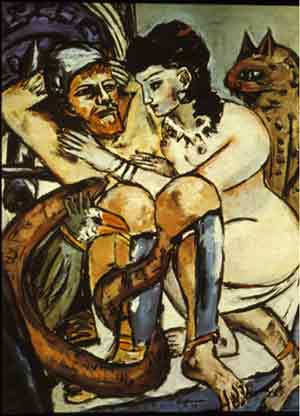
MAX BECKMANN, Odysseus and Calypso, 1943
"but now he lies away on an island suffering strong pains
in the palace of the nymph Kalypso, and she detains him
by constraint, and he cannot make his way back to his country,
for he has not any ships by him, nor any companions
who can convey him back across the seas's wide ridges."
The Odyssey, Book V: 13-17 (Lattimore, transl.)
More on Beckmann:
A page of thumbnails of Beckmann's paintings, with larger versions upon clicking. Includes several self-portraits and lesser-known works. Particualr favorites of mine: "Still Life with Saxophone", "Girl with Mandolin", "Still Life with Sea Gulls", "Quappi with Fur", and "Odysseus and Calypso".
A good biography by Matthew Drutt, from the introduction to the catalog, "Max Beckmann in Exile". Also includes a Beckman bibliography.
And a quote from the artist himself:
"The greatest mystery of all is reality."
10:45 AM
|
Friday, June 27, 2003
MAX BECKMANN
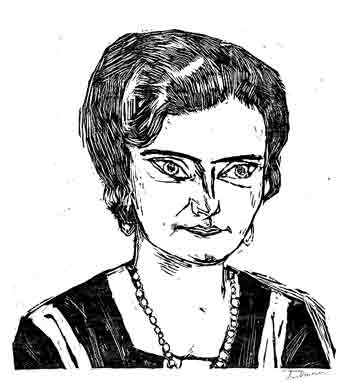
Max Beckmann, Frau H. M. drypoint, 13 ¾ x 12 7/8, 1923.
Los Angeles Country Museum of Art
I’ve always admired German Expressionism, especially the graphic works and woodcuts in particular. A new show of the paintings and graphics of Max Beckmann (1884-1950) has opened at the Museum of Modern Art in Long Island City, Queens, and I imagine it is quite an experience.
In the catalog the artist Leon Golub calls him a "suave brute," adding: "You never know with types like Beckmann whether they are playing it straight or manipulating you. I suspect that he didn't intend these images of the bourgeois world to be seen just as grotesques. He must have been laughing, stepping back and observing the context that he was painting with a sardonic eye, and observing himself in that context with the same eye."
"Max Beckmann: Chuckling Darkly at Disaster", NYT
In browsing through 10 pages of Beckmann’s graphic works in the exhaustive LACA collection of German Expressionism, I found the more familiar portraits (he did a brooding etching of Dostoyevsky, for example), self-portraits, and scenes of the bourgeois life, but was surprised to also discover a number of scenes from the life of Christ, and an entire series of illustrations for the Book of Revelations. This was an artist who had been affected enormously by the events of his time, and there was a great deal more to him than “suave brutality”.
(The LACA site is excellent and vast but frame-based; use the above link, then “Browse by Department” to “German Expressionism”, then search by artist to find Beckmann.)
2:34 PM
|
Comments, maybe! I'm doing a test run with HaloScan comments, so if you feel moved to leave a comment over the next few days, I'd appreciate it. Thanks!
2:25 PM
|
Thursday, June 26, 2003
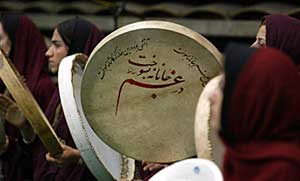
Photos from Mehr Cultural-Sports Festival in Iran Take a look and explain to me what is happening...
I always find interesting things at Payvand. Billed as "News, Directory, and Bazaar", this site contains the latest news about Iran gleaned from the world press, as well as books, essays, film reviews from and about Iran...you name it. The book listings alone could keep me busy reading for the rest of my life.

I've been thinking about Michel Seuphor's advice to "make something every day" and remembering a mentor I had when I was starting out as an artist. "Draw every day!" he told me. "Keep a sketchbook with you, and draw something, anything, but do it every day. It doesn't matter what you choose - it can be the doorknob. But keep drawing, make it a habit." This man was a gifted wildlife illustrator who could capture the fleeting pose of any bird or animal. When I asked him how he learned to do this, he told me he used to take his sketchbook and go to a skating rink. He skated in the opposite direction from the circling skaters, and sketched their poses and faces in the brief moments as they passed each other - that was how he trained his eye and mental memory.
10:13 PM
|
Wednesday, June 25, 2003
FAITES QUELQUE CHOSE CHAQUE JOUR

The Creation from the Book of Enoch. Limited edition artist's book by Natalie d'Arbeloff
I've recently discovered Blaugustine, the wondrous blog world of Natalie d'Arbeloff. She is a London artist and teacher, of Russian and French descent, who is, for one thing, the creator of extraordinary artist's books. (Facing pages from one are shown above.) She also creates beautifully-drawn and quite funny comics featuring her alter-ego, Augustine, and her adventurous encounters with politics, art, and self.

In addition to being tremendously inventive and gifted, Natalie is also a teacher of art who believes in every person's creative potential. Read Natalie's Bike Ride to Clarity for an unconventional explanation of her philosophy. I'll leave you with a quote on nurturing the creative process from her friend and mentor, Michel Seuphor:
Make something, produce something, anything, but something each day.
Put aside. Don’t judge. Make even if you repeat the same thing day after day.
To build one’s nest twig by twig.
("Faites quelque chose, produisez quelque chose, n'importe quoi, mais chaque jour quelque chose. Mettez de coté, ne jugez pas, mais faites. Même en répètant la même chose plusieurs jours de suite. Faire son nid, petit brin par petit brin.")

Briefly noted:
Affirmative Action Maureen Dowd's scathing editorial in The New York Times, on Clarence Thomas and yesterday's topic --affirmative action -- is well worth a read.
Will the West ever learn? Why were British troops attacked and killed by villagers in Iraq? Although it has taken a while for the media to report it, the story seems to be that the troops used dogs to search people's homes for weapons, and that they also entered the women's private quarters.
Perhaps we can begin to see that traditional Muslims have a different attitude than we do about "public" and "private" spaces, especially those occupied by women who may not be prepared for a visit by unrelated men. But it's hard for me to understand how clueless the British troops were in their use of dogs. The horror and disgust that a Muslim feels when they are touched by a dog, or when their yard - let alone their home - is entered by a dog, may be foreign to most of us, but it is very real to Muslims. Dogs are haram - forbidden and unclean - according to the Qu'ran. If a practicing Muslim is licked by a dog, or their clothing touched, they will almost certainly have to bathe and change all their clothing. I can't even imagine what it would feel like for them to have their home violated by foreigners with sniffing dogs. This is a basic cultural fact; what a way to learn it, and what a way to reinforce the Iraqis' growing belief that this is an occupying army of foreigners disrespectful to Islam.
7:23 PM
|
Tuesday, June 24, 2003
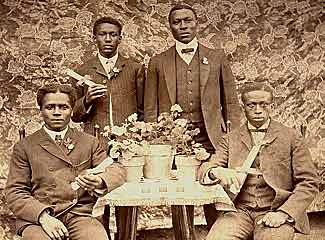
Instructor & Three Graduates with Diplomas and Geraniums (Tuskegee Institute, Alabama)
Gelatine-Silver Print, circa 1905, 4 x 5.5 inches
From the exhibition The Face of Slavery and Other Early Images of African Americans at the American Museum of Photography
Today's affirmative action ruling and a thoughtful post on the subject from mysterium got me thinking about racial inequities in our educational system, and how conditioned we are to glossing over them or looking to solutions like affirmative action, when actually the problem is far more complex.
I had a conversation recently about "diversity" with a black graduate of an Ivy League masters degree program. He said he'd like to "dissect the term diversity" for me, and proceeded to explain that of the four black graduates of the program that year, three were essentially high-income immigrants who had received their undergraduate educations at top-flight American institutions - Penn, Harvard, and Berkeley - and had nothing in common with the inner city Black American experience. Only he had come from the ghetto to a small, historically black college (which I admitted I had never heard of); excelled; and won admittance to the prestigious program. And yet this university, like many others, prides itself on its "diverse" student body, and its success in "minority recruitment".
"You have to look under the surface," my young friend cautioned. "Many students are black, it's true. But where did they really come from? Are these the descendents of slavery? Are these students, like me, who couldn't afford to go anywhere but the "historically black college"? And are these the people who, like me, are going to go back to their communties and teach, or be doctors, serve as models for other youths who see drug-dealing or ball or rap as better ways out of their situation? You have to ask, what is the real goal of the educational system?
So these are critical questions to ask, while from the outside we see something that looks like equality of opportunity. Universities also know that children of middle-class black families - families who have left the ghetto a generation or two ago - are a better bet for success than children of poverty and disadvantage. The worst injustices in education may not be being perpetrated at the university level, but in elementary and secondary schools across our country, where the racial and poverty divide is so enormous as to cut off opportunity before a child has learned to read. If you want to know what's really happening in public school education in our nation's cities, read Jonathan Kozol's Savage Inequities (1992):
In Central Harlem, notes the New York Times, the infant death rate is the same as in Malaysia. Among black children in East Harlem, it is even higher: 42 per thousand, which would be considered high in many Third World nations. "A child's chance of surviving to age five," notes New Jersey Senator Bill Bradley, "are better in Bangladesh than in East Harlem." In the South Bronx, says the author of a recent study by the nonprofit United Hospital Fund of New York City, 531 infants out of 1,000 require neonatal hospitalization-a remarkable statistic that portends high rates of retardation and brain damage. In Riverdale, by contrast, only 69 infants in 1,000 call for such attention.
What is promised these poor children and their parents, says Professor Eli Ginzberg of Columbia University, is "an essential level" of care as "distinct from optimal." Equity, he states, is "out of the question." In a similar way, the New York Times observes, a lower quality of education for poor children in New York, as elsewhere in America, is "accepted as a fact." Inequality, whether in hospitals or schools, is simply not contested. Any suggestion that poor people in New York will get the same good health care as the rich or middle class, says Dr. Ginzberg, is "inherently nonsensical."
"Out-and-out racism, which in our city and our society, is institutionalized," said David Dinkins in 1987, a year before he was elected mayor, "has allowed this to go on for years."
Excerpt from Savage Inequities (1992) by Jonathan Kozol (other excerpts available on the web discuss racially-inequitable education in Camden, NJ; East St. Louis; Washington, D.C.; and Chicago.)
7:57 PM
|
Monday, June 23, 2003
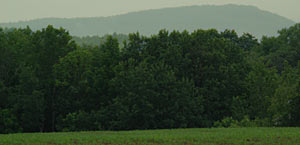
A friend writes;
We went to dinner on Saturday at a beautiful home in Lidingoe, an island on the Baltic archipelego. That was on midsummer night, in Stockholm a major holiday where the sun just dips below the horizon all night and it never gets dark, and the sun rises again around 3:45 a.m. It is on the same latitude as St. Petersburg, and so these are in fact ''white nights'' right now.
My friends there are all castaway eastern Europeans (plus a handful of Swedes) who had ended up in Stockholm as the iron curtain was raised or their countries just got too chaotic to stay there, they are Hungarians, Serbs, Croats, Poles, Russians.
A MEADOW
It was a riverside meadow, lush, from before the hay harvest,
On an immaculate day in the sun of June.
I searched for it, found it, recognized it.
Grasses and flowers grew there familiar in my childhood.
With half-closed eyelids I absorbed luminescence.
And the scent garnered me, all knowing ceased.
Suddenly I felt I was disappearing and weeping with joy.
Czeslaw Milosz
8:52 PM
|
Sunday, June 22, 2003
ISLAND MENTALITY
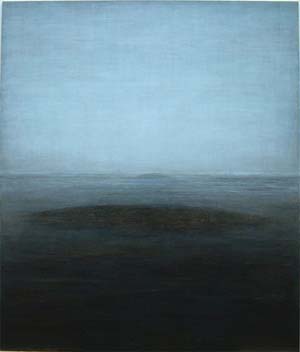
Georg Gudni (Iceland), GG #42, oil on canvas, 244 x 208 cm
..."Who shut in the sea with doors when it burst out from the womb? When I made the clouds its garment, and thick darkness its swaddling band, and prescribed bounds for it, and set bars and doors, and said, 'Thus far shall you come, and no farther, and here shall your proud waves be stopped'? "
"Have you entered into the springs of the sea, or walked in the recesses of the deep? Have the gates of death been revealed to you, or have you seen the gates of deep darkness? Have you comprehended the expanse of the earth? Declare, if you know all this."
The Book of Job 38:1
This morning I had the privilege of singing Mozart's Missa Brevis in Bb, for organ, choir, and a small group of strings, at church. What a glorious way to inaugurate summer and end our rather grueling but enjoyable choir season until fall.
The Old Testament lesson was from the great Biblical argument between God and Job, with God speaking to Job "out of the whirlwind". The sermon was about discipleship being "the ship in the storm" - that idea that true Christianity involves leaving one's safe harbor of complacent predictability, and entering the storm of the world's suffering, injustice, and chaos. The rector illustrated his point with the recent "storm" generated by the Episcopal Diocese of New Hampshire's selection of Gene Robinson, an openly gay man in a committed relationship, as Bishop-elect.
I happen to know Gene a little, and have worked with him on a few occasions. He is a remarkable person who will be a fine Bishop - and he will certainly not be the first gay Bishop in the Anglican church - only the first one to admit it. As the Rector remarked, what is different about Gene is that he is a person who is called "to honesty". Thus he has become a symbol, and New Hampshire has become a whirlwind within the Anglican Church worldwide over this issue.
Afterwards I was talking to an Icelandic friend (who had come to hear the music) about the huge flap this appointment has created in Britain. There are large numbers of gay clergy in England - some have said that if all the gays were asked to resign, England would lose 30% of its clergy - but British society has an unwritten rule of "don't ask, don't tell" that keeps people in the closet. I can hear them now, exclaiming, "Those Americans have done it again, with their damn openness!" Of course what we hear in official objections are conservative theological arguments; "Scripture forbids homosexuality", and so forth. But I think the real fear is not of making decisions that conservatives say are "an abomination to God", but of breaking the taboo on honesty: if this Bishop openly admits he is gay, then where will the truth-telling stop? And what is the cost -- to me?
My friend had an interesting cultural take on this. He said, "I think it's partly due to an 'island mentality'. "In Iceland we have it, for sure, and Ireland does, and I would guess that England does too. It's a collective decision by the inhabitants of an island to form a behavioral pact: this is how we are going to deal with such-and-such an issue, and everybody tacitly signs on to it. When someone breaks that pact, it's as if you're betraying all the inhabitants of the island, so people get very upset."
Needless to say, I had never thought of this, or how deeply imbedded such an unspoken cultural "rule" might be in a society and its institutions.

For a completely different inside take on cultural differences, read Joerg's comments at Conscientious on how he views his native German culture after several years of living in the U.S. Joerg insists he 's not a good writer, and Ok, maybe he doesn't have a polished style - English, after all, is not his first language. But he has something a lot of writers lack and can't make up for with "style" - content. Take a look.
7:43 PM
|
Saturday, June 21, 2003
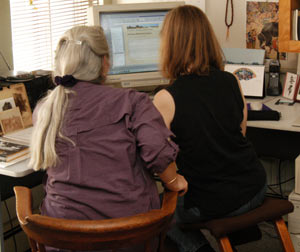
Pica and Cassandra dual-blogging at the Ecotone Wiki
On Friday, it was a great treat to welcome Pica from Feathers of Hope to our house and garden. Although we both had created entirely different mental images of each other (she had imagined me with long, straight, dark hair) we felt an instant bond and the afternoon flew by much too rapidly. Pica, a lover of calligraphy and the book arts, is the only person in recent memory to have exclaimed over the pen collection in my office, or who's wanted to see my calligraphy and book binding. But she is also a birder par excellence; over lunch in the back yard she stopped and remarked, "Ah, a Carolina wren!" just by hearing the bird's call. I know plants, but I don't know many birds by sound alone. In the photo above, we're making a dual post on the Ecotone Wiki in my office; that's Pica on the left and me on the right. Visit Feathers of Hope for Pica's take on the day.
Today we had an entirely different visit, from an old photographer friend we hadn't seen in twenty years. I don't think I would have recognized him by sight. It wasn't until I got up and was rummaging around in the kitchen, overhearing snatches of conversation about cameras and technical photographic matters between him and my husband, in voices that were entirely unchanged, that I sensed the time warp.
8:56 PM
|
Friday, June 20, 2003
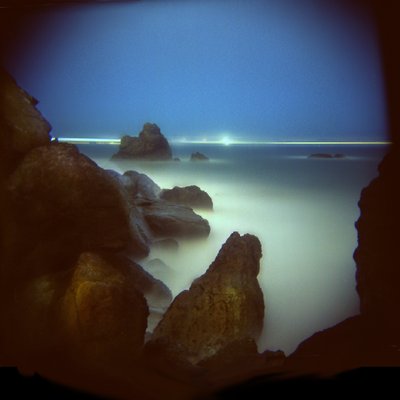
Sutro Bath, by Suzanne Friedrich (via Conscientious)
INTO THE ARK
Wislawa Szymborska
An endless rain is just beginning.
Into the ark, for where else can you go,
you poems for a single voice,
private exultations,
unnecessary talents,
surplus curiosity,
short-range sorrows and fears,
eagerness to see all things from all six sides.
Rivers are swelling and bursting their banks.
Into the ark, all you chiaroscuros and half-tones,
you details, ornaments, and whims,
silly exceptions,
forgotten signs,
countless shades of the color gray,
play for play's sake,
and tears of mirth.
As far as the eye can see, there's water and hazy horizon.
Into the ark, plans for the distant future,
joy in difference,
admiration for the better man,
choice not narrowed down to one of two,
outworn scruples,
time to think it over,
and the belief that all this
will still come in handy someday.
For the sake of the children
that we still are,
fairy tales have happy endings.
That's the only finale that will do here, too.
The rain will stop,
the waves will subside,
the clouds will part
in the cleared-up sky,
and they'll be once more
what clouds overhead ought to be:
lofty and rather lighthearted
in their likeness to things
drying in the sun -
isles of bliss,
lambs,
cauliflowers,
diapers.
12:49 PM
|
Wednesday, June 18, 2003
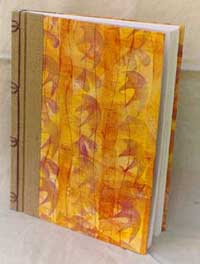
Personal journal, Japanese side-sewn binding with hand-painted/hand-printed cover papers, 1994
I'm psyched - tomorrow, Pica from Feathers of Hope is coming by for a visit. We've never met, so we're both looking forward to matching reality with our digital impressions of one another. She's out on the east coast visiting family and friends, and taking a swing through our region. Exciting! Bloggers meet in real life! Pica and I are both designers and lovers of the book arts; we recently shared notes about skivving* leather for bookbinding...definite esoterica, but frustrating as hell if you've ever tried to do it without a master bookbinder standing over your shoulder.
The book above has a Japanese sewn binding that uses cloth and thread rather than leather and glue. In this kind of binding, the trick is to avoid stabbing yourself with the stiff sewing needle and getting blood all over your pages during the final operation - I never got very good at it, but enjoyed the process a great deal, and have been thinking lately about doing some more. (I must have surgery on the brain today, after spending part of the day waiting for my husband in the dental office while he had a molar extracted -- yowch!)
(*Skivving is the process of thinning the edges of the "wrong side" of the leather used to make a book's spine. You must use a very sharp, special knife. If you go too far, you'll tear or rip the leather. Not far enough, and the exposed edge will be unsightly and thick.)
9:02 PM
|
"The writer is something of a shape-changer and trickster, someone a little more treacherous, eccentric, and unpredictable than she at first appears, because she is continually buffeted and transformed by an inner life invisible from the outside. She may speak to you in complete sentences about what her day was like, but inside another life is being lived, one full of beauties and monstrosities, upheavals and transgressions."
Eric Maisel
via whiskey river
9:02 AM
|
Tuesday, June 17, 2003
I wish I could have shared this glorious summer day in New England with all of you. It was dry, perfectly temperate, and except for a fine dust of tree pollen in the air, absolutely clear. Blowsy white clouds drifted overhead in a cerulean sky, and in the garden, orange Oriental poppies held court in front of deep purple lupine. The peonies, Siberian iris and highbush cranberries are in full bloom, and the budded roses just beginning to show color. Wait a few weeks, and we'll be sweltering in humid 90-degree days, unable to sleep and taking three showers a day. But today -- today was perfection.
Weeding in the back of the garden, I somehow worked myself underneath a thick stand of hollyhocks so that my head and shoulders were actually inside a small chamber formed between their stalks. And suddenly I remembered myself as a little girl, in the hiding spot I used to play in under my grandmother's snowberry bushes and honeysuckles. What was it? I wondered. Surely not the size of things - here I was, like Alice, all grown up and far too big to fit into this child- or cat-size space. But the memory was intense and persistent, so much so that I relaxed and tried to stay in my cramped spot as long as I could. Finally it came to me: it was the silent, cool smell of the damp, rooty earth, in contrast to the fragrant, pollen-rich, smell of summer air, sun-baked leaves and warm soil -- a smell secret and unusual enough to have triggered a certain synapse, and unlocked a door of memory.
9:25 PM
|
Monday, June 16, 2003
A little housekeeping this evening. I've deleted links to some political blogs I'm not reading, and added three new favorites. Beneath Buddha's Eyes is the personal journal of writer/photojournalist Tony Anthony; it is written with great honesty from the heart, doesn't shy away from difficult subjects, and is visually stunning. Mysterium talks about culture, especially in New York City, with excellent links and includes some good poetry by the author himself. And Whiskey River is a daily compendium of quotes and clippings; many recent ones have been about the art, craft, and agony of writing and have been much appreciated by this reader. All are worth your time...
I'll be adding some additional place blogs over the next day or two. The first collective Ecotone blog was terrific and contributors wrote some remarkable and diverse posts; check it out at the Ecotone Wiki.
9:13 PM
|
Sunday, June 15, 2003
PERMALINK
Today some of us are writing collective blogs on the topic “How I started thinking about place – and why I started writing about it”. You can read others at the Ecotone Wiki, and I encourage you to do that; there are some fine writers and thoughtful place bloggers out there – not just from America, I might add - and this is our first effort to blog collectively.
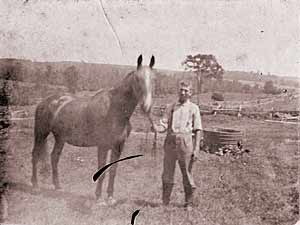
Wally with Diamond, Beaver Meadow, N.Y., c. 1900
Somewhere in the family photo archives, there’s a picture of my grandmother, my great aunts Inez and Minerva, my mother, and me - as a little girl - prowling through the underbrush near a small creek. It was taken during a family picnic in Beaver Meadow, New York, in the mid 1950s.
The photograph above was taken half a century before, in the same place. That’s my great-grandfather with his horse, Diamond. On the back of this photograph of her father, Inez wrote, “I read Dickens’ History of England under the tree at the far right, and under the tall elm, my cousin and I had our wilderness camp in ‘Indian country’.”
Beaver Meadow is a tiny hamlet in the hills of central New York. It hardly exists anymore, except as a crossroads, but that’s where some of my ancestors settled. The picnic I vaguely remember must have been one of the last times we visited the family farm. My grandmother reluctantly sold it not long afterwards – the family had moved “into town” years before, and her parents had died. But all my childhood I heard about that farm, and Beaver Meadow, from people whose lives had been shaped by that particular place with its trees and hills, the rhythm of the farm and the seasons, the neighbors, the pets and livestock, the secret hiding places of children. It was simply their way of thinking about identity – that you belonged to the place where you lived and knew it intimately, because it was worthy of your attention, study, care, love, and memory.
This older generation passed their love of place on to me, even though their notion of “place” become larger after they moved down into the broad valley of the Chenango River, exchanged horses for automobiles, began to travel, and saw the world expand through two world wars. “Place” was a fluidly expanding and contracting concept: it might mean the America written about by Willa Cather – the Plains where one great-great uncle had gone to settle - or the southern cities of Tennessee Williams that my grandparents visited on their road trips. A different kind of “place” also existed vividly for all of us in far-flung books and in imagination: thus my great aunt’s History of England, read under a tree in the pasture, and her imaginary childhood “Indian country” beyond. But just as easily, it could turn into my little patch of mint under the grape arbor behind the barn, where a wolf spider lived; or the fur-lined rabbit nest in the perennial bed, carefully protected by my grandfather.
When I was twelve, my great aunt Inez, who was a history teacher without children or grandchildren of her own, gave me a book of stories she had written about her childhood back in Beaver Meadow. Even at twelve, I understood that this was more than another installment in the collection of American history books she had already given me. Of course I didn’t appreciate what she had done until much later, when I had moved pretty far away myself and was starting to think about my own identity and where it had come from. When I re-read her stories and journals after her death at 88, I also found a long, evocative description of life on the family farm in the 1880s, written by her mother. My own grandmother, who wrote me letters about her garden until she was 90 years old, and my mother, who just sent me an email about finding gooseberry bushes in the woods across the road and with whom I’ve prowled countless woods and shorelines, also conveyed the same messages about the importance of place in the midst of chaos, confusion, and change.
It’s taken me a while to begin the grasp the nature of the torch I’d been handed at age twelve. I eventually discovered that the point was not to go back to Beaver Meadow and retrace my heritage, or even to write in the same descriptive vein about my adopted home in New England. It was to enter as seriously into relationship with my particular place in time and space as these women had, to learn from it, and to find my own ways of passing it on. What they had done was to capture the beauty of lives lived simply and attentively, and in doing that to tell me, “Here is something that will see you through”.
I write about place, in both a particular and a broad sense, because I’ve realized that I was given something precious that most people in our culture simply don’t have. A sense of deep connection and belonging -- to nature, to place, to the mystery of existence and creation: these are our birthright as human beings. There is no greater evidence for me of the alienation of modern life than the fear most people have of nature, co-existing with an equally intense sense of hunger, longing, and homelessness. As we’ve paved over our meadows and plastic-wrapped our foods, we’ve obliterated the paths designed to take us back to our origins and the truth about ourselves; we’ve encapsulated our souls. The enormous sense of loss I feel, observing the changes in attitudes and destruction of the environment that have taken place since my family left the farm in Beaver Meadow, is nothing compared to the collective loss I feel for the souls of humanity.
And so I write about place in the hope of awakening that inborn spark of recognition; of de-mystifying the web of connectedness between 21st century humans and the living earth; and of perhaps offering a safe passage, comfortably cushioned with words, into silence, wonder, and love. Without those, I don’t think there is much hope of awakening a sense of responsibility toward this fragile earth.
1:03 PM
|
Saturday, June 14, 2003
PERMALINK
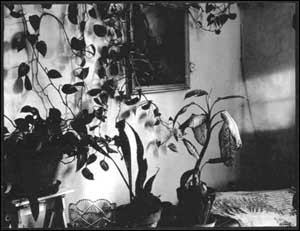
Interior by Wojciech Zawadzki, from Galeria FF
I have concluded that the whole misfortune of men
comes from a single thing, and that is their inability
to remain at rest in a room.
Pascal
From a beautiful essay in Orion on the search for solitude and silence by Scott Russell Sanders. (via wood s lot)
Yesterday we ran into an old friend, and were stunned to hear he’d just received a devastating diagnosis. The second such bad news in a week. Afterward, my husband and I just looked at each other; there was absolutely nothing to say.
Later I had lunch with a close friend, a man in his 70s, and asked, “do you ever get used to this?”
“No,” he shrugged. “At our age it simply becomes common. You expect it. That’s why I think I like Szymborska: she’s seen it all, she still has religious faith, but God is so far removed he’s meaningless, no help at all. And really, what else is a Pole going to think? Or a thinking person who’s lived through a year like this, in our world? Look around at the men who are running things, what they’re saying. It’s enough to make you go mad.”
My friend described Wislawa Szymborska’s poetry as having a “jaunty bitterness”, and I think he’s right, although it appeals less to me than to him – maybe I haven’t been hammered enough yet by life to lose my attachment to lyricism, or see it gradually replaced by irony or cynical, black humor. I’m terrified about that, actually, and will do anything to avoid it, other than hiding my head in the sand. That’s really my question these days: how to live in a world like this, with eyes wide open, and still keep my lightness, joy, hope, capacity to stay in the moment, desire to help -- and not feel overwhelmed by people’s sufferings and needs.
Certainly the answer is not in running, running, running, because there’s no escape. For me, it’s often in sitting still, face-to-face, with this paradoxical, unfathomable, goassamer thread we call existence. And dipping my hand into that silent well of human courage, distilled from centuries of tears.
11:59 AM
|
Friday, June 13, 2003
I finally broke down and bought a book on learning Farsi: "Teach Yourself Persian", by John Mace. It begins at the beginning, with "alef", "a". About a year ago, I made my first attempt to learn to read the alphabet that is the basis of both Arabic and Persian. I still remember the day when I was able to sound out my first words, when the incomprehensible, beautiful squiggles that make up written Arabic suddenly took on sounds, and became a word. I didn't keep up with it, and I've forgotten most of what I learned, but I hope I can begin again and stick with it: one letter, one word, one concept at a time.
It helps to have Persian friends. I know some vocabulary now, and a few verbs. When I watch an Iranian movie I can pick out a word or phrase here and there, and it's a wonderful moment, like lighting illuminating a dark, confusing, jumbled room. "Ab!" I hear. "Water!" My first Farsi sentence was the same one used in children's reading books, "Baba ab dad": "Father gives water". It's the equivalent of "Run, Spot, Run", and when I said it for myself I was as proud as any five-year-old.
The other night Shirin brought us a "care package" from a recent trip to Montreal. It contained fresh-baked bread with zatar (sumac), jet-black nigella seeds, tamarind paste, and a bottle of keskh, a strange but deliciously tangy sauce made from dried yogurt. Today I looked at the bottle and its Arabic label. K- Sh - K. Amazing.
8:26 PM
|
Paintings and drawings by e.e. cummings, via mysterium
7:28 AM
|
"Inner silence works from the moment you begin to accrue it. The desired result is what the old sorcerers called stopping the world, the moment when everything around us ceases to be what it's been.
It is this moment when man the slave becomes man the free being, capable of feats of perception that defy our linear imagination."
Carlos Castaneda
via whiskey river
7:15 AM
|
Thursday, June 12, 2003
PERMALINK
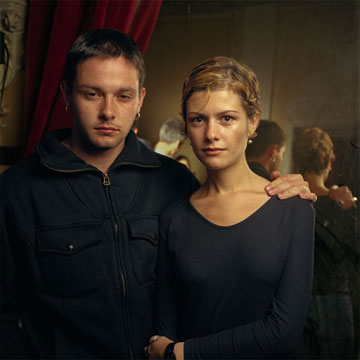
Bulgarian Couple by Missirkov & Bogdanov
via Conscientious
A few days ago, an interesting question was posed at Intermezzo in C. The author had been reading Doris Lessing's Love, Again and asks, "Does romance require an obstacle?" giving a few examples such as the medieval idea of knight and unavailable lady, and the unrequited love that (as the author, a pianist, wryly points out) has given rise to some great music.
I haven't read Lessing's book, but I have been mulling this question, from the point of view of a 22-year marriage that's structured around a 24-hour-a-day business and marriage partnership. Sure sounds like a recipe for boredom and non-romance to me! But, strangely, it's neither boring nor unromantic, though the romance isn't of the bouquet-of-long-stemmed-roses variety. Fred at Fragments from Floyd has just celebrated 33 years, and has been considering that with wonder, too.
I think what romance requires is tension: not tension in the sense of simmering anger, but the tension of opposites, the deliberate experiment with difference. Obstacles certainly are a subset of "tension", and form the basis of some great romantic plots built around age difference, or separation through distance or family prohibitions, or inattainability. Romance that springs from insurmountable obstacles just as often withers as soon as the object of desire is actually present or attained. So how do you keep it?
In our own peculiar case, we're fortunate not to ever find each other boring: an attitude that is less a product of one's own view, than a mutual decision to keep learning, growing, changing - and to encourage that in the other person. But the romantic tension that I'm speculating about comes from, I think, an ongoing fascination with the inherent enigmatic quality of the other person's "otherness". As close as we are, I am still "other" by virtue of my femaleness, my wasp-ness, my rural, country background -- as well as all my particular personality traits - all totally loveable, I'm sure. And he is "other" by virtue of his maleness, his middle-eastern-ness, his more sophisticated, worldly background, and his own traits: frustrating and glorious as they are. Sometimes we hold our forearms next to each other and look at the different colors of our skins - mine nearly white, his perpetually tanned - as if they are symbolic of both our strangeness and our coming together. "Look at you!" we breathe. "Look at you!"
8:44 AM
|
Where do the cuts happen first when the economy is sinking? In the arts. Take a look at this BBC story on cuts in state arts budgets across the U.S. Don't get me started...
8:06 AM
|
Tuesday, June 10, 2003
I'm a happy girl tonight. I spent a couple of hours in the university library and came home with an armload of poetry books and essays on modern Polish poetry; I can't wait to crawl into bed and begin.
When I first arrived at my own university, years ago, from the small town where I'd grown up, I had never had to deal with a large card catalog, or stacks, or reserve reading, and I was both completely intimidated and afraid to ask for help for fear of revealing my inexperience. Gradually, though, I learned how to use the vast library; I can remember how it revealed its secrets to me slowly, one by one, unfolding like a love affair. In spite of the allure of the internet, and all the research I do on it, there is nothing I love more than the smell of old books in the stacks; the delicious suspension of time; the anticipation and quickening excitement of following a trail that I sense will lead me somewhere new, somewhere I've always wanted to go but just didn't know about until...this moment. Today I brushed away dust on a bottom shelf as I pulled out a book of criticism of post-war Polish poetry. Had no one been here for years but me? Why was this particular book falling into my hands, at this moment in time? What would it mean? What would it revel to me, or about me? What might I bring to this reading that hadn't been brought before -- for each encounter with each book, by each reader, is unique.
In the meantime, Adam Zagajewski bids us to sleep well:
NIGHT
Dances beautifully
and has great desires.
Seeks the road.
Weeps in the woods.
Is killed by dawn, fever,
and the rooster.
from Mysticism for Beginners, 1997
Esoteric news story of the day, from the BBC: Scientists in Egypt say they may have discovered the mummy of Queen Nefertiti
9:02 PM
|
Monday, June 09, 2003
ST. COLUMBA, IONA, AND THE BOOK OF KELLS

St. Matthew, from The Book of Kells
Anglicans have a peculiarly typical book called “Lesser Feasts and Fasts” that lists observances of “saints” and historical figures for nearly every day throughout the year. I'm finding that it's a good compendium of obscure but fascinating people and events...
Today, June 9th, is set aside for Columba, the Irish monk who founded the Abbey of Iona, off the coast of Scotland, in AD 600. Columba (he was a clansman of royal lineage, but his baptismal whose name means "dove") was an avid scribe, and is thought to have taught his monks calligraphy and illumination. About 200 years after Columba’s death, the monks of Iona created The Book of Kells to commemorate his life. Some consider this 339-page book to be the most beautiful example of medieval illumination ever created. It is certainly the greatest example of Celtic art, with its animal and human figures, elaborate knotwork, and beautiful script.
When the Vikings began raiding the British coast at the end of the 8th century, Iona was sacked and burnt. In AD825 many of the monks were killed when they refused to disclose where St. Columba was buried. Eventually most took refuge in Kells, Ireland, taking the famous Book with them. It now resides at Trinity College, Dublin.
On the eve of his death he was engaged in the work of transcription. It is stated that he wrote 300 books with his own hand, two of which… have been preserved to the present time… In the spring of 597 he knew that his end was approaching. On Saturday, 8 June, he ascended the hill overlooking his monastery and blessed for the last time the home so dear to him. That afternoon he was present at Vespers, and later, when the bell summoned the community to the midnight service, he forestalled the others and entered the church without assistance. But he sank before the altar, and in that place breathed forth his soul to God, surrounded by his disciples. This happened a little after midnight between the 8th and 9th of June, 597. He was in the seventy-seventh year of his age.
New Advent Encyclopedia

By coincidence, I was working today on an invitation that needed a Celtic knotwork border. I found and downloaded a terrific shareware Celtic border font by Daniel Steven Smith. It not only has single-and double-stranded border possibilities, but also braided and twisted knotwork characters, standalone icons, and even the building blocks for chainmail. It's easy to use, comes with an excellent .PDF file explaining the different options and how to construct patterns with them, and can be used in any point size. It's free for non-commercial use, but If you download it, consdier sending him a contribution, this is quite a piece of work.
8:52 PM
|
Sunday, June 08, 2003
HAPPY BIRTHDAY BRITISH MUSEUM!
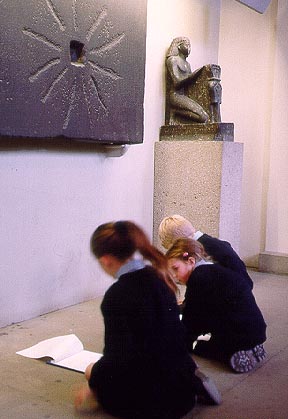
School children drawing in the Egyptian Galleries, British Museum, 1999
Some of the happiest hours of my life have been spent in the British Museum, which celebrated its 250th anniversary yesterday. Our visits to London have generally been around Christmastime, and we stay in Bloomsbury, in a modest hotel, chosen because it's only a few blocks from the museum. In the morning, after our breakfast of porridge, eggs, granary toast and grilled tomatoes, we often walk up the street, around the corner, and along the tall wrought-iron fence, studded with exhibition posters, encircling the venerable institution. As I read them - "Calligraphy from Persia", "Korean Ceramics", "New Acquisitions from the Levant," my heart would race with anticipation. Past the pungent smell of roasted chestnuts sold by street vendors, past the corner pub, the little shops filled with coins and antiquities, the small restaurants advertising "jacket potatoes" -- and there was the famous facade, the pigeons in the plaza, the guards just opening up the gates for the day -- a day bound to teach me something I'd never imagined.
From a journal of our trip in 1998:
Here, in the intensity of this sudden brief immersion in human history which our visits to London, above all, are, time compresses and expands with dizzying speed. One moment you are overcome by the length and breadth of man's walk upon this earth; you see yourself as one tiny dot in the continuum, the parade of rising and falling civilizations with their pinnacles of achievement. At the next moment, you are face to face with another human being who wrote a letter or drew a line -- and the time and distance compress into nothing as you recognize yourself and your own desires and strivings. It's a bizarre effect, and would be disorienting if it didn't feel, in a way, that I am simply playing the role I am meant to play. These objects; possessions; things people have made, used, carried, treasured, and left behind are a kind of message: a code meant, this particular day, for me. They say, "I was here, I existed, this mattered to me. See it and perhaps you can see me too."
3:09 PM
|
Friday, June 06, 2003
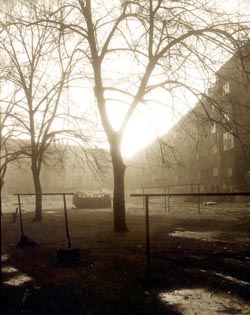
Ewa Andrzejewska at Mala Galeria
Sainteros writes: “In the case of the Polish experience, I wonder if geopolitics has more to do with it than faith,” mentioning how many times the country has been invaded. He goes on to say that he appreciates the poetry of Adam Zagajewski (as I do), and notes, “There's something of the bittersweet in him, too, but his faith, albeit a very abstract one, seems strong.”
My own tentative theory is that people who have been under personal and cultural oppression react in two general ways. One is in the direction of bitterness, cynicism, nihilism – I’d even go so far as to label that way “dark” – and the other direction is toward realism colored by love: i.e., trying to find light in suffering thorugh awareness of love, beauty, timelessness. Perhaps these are simply the ways of the pessimist and optimist, but I suspect it goes deeper than that. And both find common ground, and blurring of boundaries, through irony and humor.
Today I found some essays on polish culture that look excellent and I’m looking forward to reading them this weekend. In the meantime, here is an offering from the contemporary Polish poet Adam Zagajewski:
Don't allow the lucid moment to dissolve
Don't allow the lucid moment to dissolve
Let the radiant thought last in stillness
though the page is almost filled and the flame flickers
We haven't risen yet to the level of ourselves
Knowledge grows slowly like a wisdom tooth
The stature of a man is still notched
high up on a white door
From far off, the joyful voice of a trumpet
and of a song rolled up like a cat
What passes doesn't fall into a void
A stoker is still feeding coal into the fire
Don't allow the lucid moment to dissolve
On a hard dry substance
you have to engrave the truth
--Translated by Renata Gorczynski
What I’m interested in exploring -- in the expressions of all cultures and individuals -- is how we find meaning, and how a particular world view develops out of that search for meaning. Here, for example, is a fascinating comment from Zagajewski:
I will never be someone who writes only about bird song, although I admire birdsong highly - but not enough to withdraw from the historical world, for the historical world is fascinating. What really interests me is the interweaving of the historical and cosmic world. The cosmic world is unmoving - or rather, it moves to a completely different rhythm. I shall never know how these worlds coexist. They are in conflict yet they complement each other - and that merits our reflection.
9:27 PM
|
Thursday, June 05, 2003

Warsaw Street Sign by Anne-Christine Voelckel
from Ruavista Magazine (via wood s lot)
I became curious about Eastern European post-war art, and Polish art in particular, when I first came across the sculptures of Magdalena Abakanowicz many years ago – but except for the poetry of Milosz, which I admire, I haven’t done much about pursuing this subject. Lately, though, I’ve been looking at some post-war Eastern European photography, and right now I’m reading “View With a Grain of Sand” by Nobel winner Wislawa Szymborska.
It’s rough going. Some of the poems – most of the poems – have passages, phrases, that are striking and luminous. What I’m having trouble with is the tone, which veers off into the dark, the biting, the cynical. The poems I’ve read so far aren’t hopeless or despairing, nor do they dwell onlonging, resignation, or even sadness. They aren’t even nobly bitter. Instead there is a sense that the writer feels tricked by life – as if she came into the world expecting something else, and got this instead – the ability to see beauty and joy, and yet she’s learned not to trust them. The bitter pill, the deception, the double-cross – is always in her vision.
Is this a failed Catholicism, I wonder? I’ve wondered that before about certain art from this part of Europe: a sense of abandonment, of promises unkept: God is still noted, but like a father who deserted his family. Older but wiser, the child now views the world with cynicism. It’s certainly one very understandable way to react to devastation and a post-modern, post-Christian world. I think it disturbs me first becaue it goes against my own nature completely (I’m with the Warsaw street sign above!) but more so because I fear this type of insidious cynicism and darkenss creeping into American culture during the next few decades.
Szymborska’s poem “Seance” is about chance meetings, coincidences:
Happenstance twirls a kaleidoscope in its hands.
A billion bits of colored glass glitter.
And suddenly jack’s glass
bumps into Jill’s.
Just imagine in this very same hotel.
I turn around and see –
it’s really her!
Face to face in an elevator.
In a toy store.
at the corner of Maple and Pine.
but the poem ends:
We want to shout:
Small world!
You could almost hug it!
And for a moment we are filled with joy,
radiant and deceptive.
Stay tuned, cheerier things to come!
5:30 PM
|
Wednesday, June 04, 2003
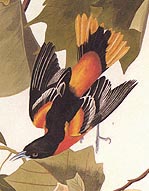
Baltimore Oriole by John James Audubon (detail)
This morning, the crystalline song of an oriole drew me onto the front porch. The bird was singing invisibly from the top of a tall maple tree, a block in front of our house, singing its fast-beating heart out, serenading the neighborhood with music as beautiful as anything nature or human could conceive. Each year a pair of orioles makes their home near our house. I'm usually in the garden, working, and suddenly overhead, there is the song, and I say ahh, they're back, it's summer. Orioles are aggressive and fast, and I think of them inhabiting and singing from the tallest trees. But we often see them in the garden, like robins, foraging for food; when we had a cat I held my breath and told her I'd wring her furry neck if she ever brought one to the back steps.
A few weeks ago I saw the pair tumbling through the branches of the apple tree, screeching at each other, free-falling, it seemed, over and over, in a brilliant flashing of black and orange. Was it a mating dance, or actual anger? Now we hear them chattering and singing, and see them dashing through the trees, but I haven't yet spotted their deep nest, swaying like a Victorian purse from the tips of a supple high branch, waiting for the wind to rock the babies into adulthood and song. One day, just as suddenly, they'll be gone.
To the Tune of "Joy in the Oriole's Flight"
The dawn moon begins to sink,
and last night's mist dissolves.
Speechless, I toss on my pillow:
my dream is of a return to fragrant grasses
and my thoughts cling, cling to them.
In the distant sky, the geese call once and are gone.
The orioles cry, then scatter,
leaving the last of the blossoms to decay.
I'm terribly alone in the deep court:
do not let the last of the red petals be swept away
but leave them for the dancing girls
to step on as they walk home.
- Li Yu
from The Silk Dragon, translations form the Chinese by Arthur Sze
8:30 PM
|
Tuesday, June 03, 2003
THOMAS MERTON ON CHANGE:
In a time of drastic change, one can be too preoccupied with what is ending or too obsessed with what seems to be beginning. In either case one loses touch with the present and with its obscure but dynamic possibilities. What really matters is openness, readiness, attention, courage to face risk. You do not need to know precisely what is happening or where it is all going. What you need is to recognize the possibilities and challenges offered by the present moment, and to embrace them with courage, faith, and hope. In such an event, courage is the authentic form taken by love.
Conjectures of a Guilty Bystander (1965, 1966)
9:06 PM
|
Monday, June 02, 2003
NACH ST. PETERSBURG
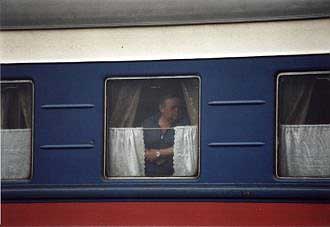
"My birthday present: an excursion to St. Peterburg and some views behind the facades"
compiled by Connie Müller-Gödecke at Avantart
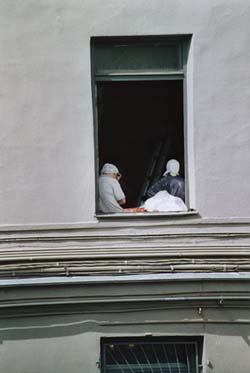
9:23 PM
|
Sunday, June 01, 2003
My morning began with Monteverdi - our choir sang one of his wonderful, bright motets as an offertory - but my gardening plans were washed out by yet another rainy, cold afternoon. So J. and I headed south, down toward the "land of the flatlanders" (that's any state below New Hampshire, Vermont or Maine) to do some long-overdue shopping at a...yes, it's true...mall. It seemed like a good idea at the time. I drove and J. took pictures. In the stormy light, the green was so intense you could taste it: a veritable salad bowl of green, uninterrupted by habitation, power lines, billboards, industry. But suburban life appeared soon enough. After weeks of slow meandering around the same paths I always follow at home to buy food, pick up the mail, go to business apointments, and visit friends it was hard to acclimate myself to the 70 mph speeds and aggressive driving, but that was nothing compared to the sensory assault of the mall. "Why does it smell like a new car in here?" J. asked.
"Because the whole thing is made of plastic?" I suggested.
When J. and I met up after an hour for a cup of coffee and something to eat, we both sat down with our tray full of plastic and paper and heaved a simultaneous sigh. "It's the noise," he remarked. "There seems to be a competition in here about who can make the most noise - visual, audio, whatever. It's like it's supposed to make you want to buy things, but actually it just exhausts you."
And the colors: for weeks, I've been hungrily eyeing the subtleties of natural color as spring suffused our black-and-white landscape. In the mall today, I was stunned by the garishness of the colors, the cheap chemical dyes used in so much clothing, and the screaming colors of signage and packaging. And in turn, I was taken aback by my own sensitivity to it. Am I that out of touch?
I like cities. It's the suburbs and unrestricted development that saddens and grates on me: the sameness of the franchises, the prepackaged desire; the programmed Pavlovian response designed to make a whole lot of people want cheap, poorly-made stuff they don't need, and spend hours of time wandering around an entirely artificial landscape in a daze. We did our shopping, and went home after two hours.
There's a point on the way where the landscape -- until then a corridor of buildings giving way to meadows and woods, then giving way to forests on either side of the road - suddenly opens up and we could see the mountains, slate blue in the distance, below fast-moving storm clouds, and in the near distance an unbroken range of green forested hills, white pines rising above the deciduous canopy, the trunks of paper birches punctuating the relentless green. "Ah," we both said. "Ahhh."
9:21 PM
|
|
|